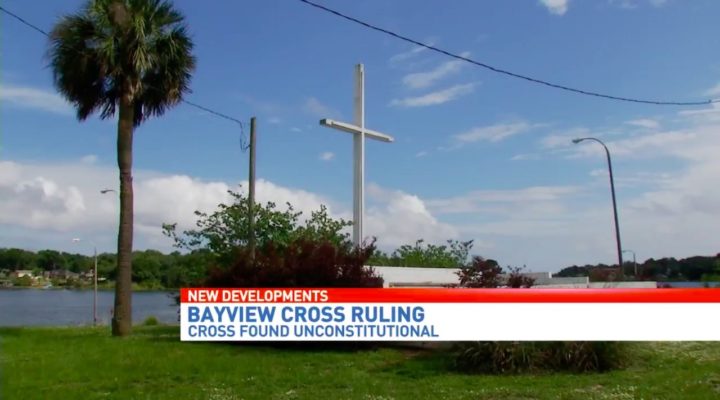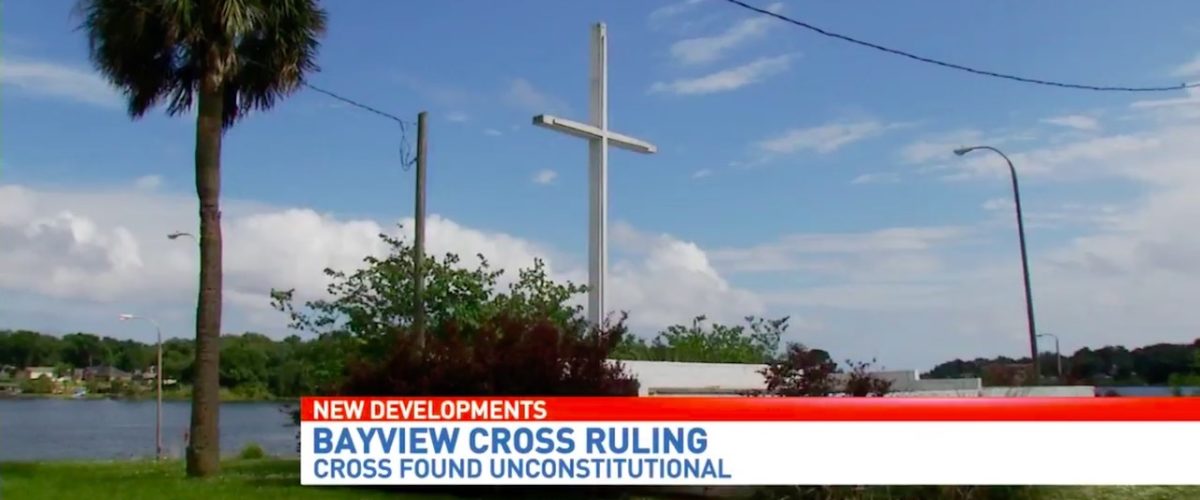The Baptist Joint Committee for Religious Liberty has joined 13 other religious and civil rights organizations urging a federal appeals court to uphold a lower court ruling finding a cross erected on public land in Pensacola, Fla., is unconstitutional.
In a brief filed Nov. 22, lawyers from Americans United for Separation of Church and State urged the 11th U.S. Circuit Court of Appeals to affirm a June 19 ruling ordering removal of a 34-foot cross in Pensacola’s Bayview Park — but not the judge’s criticism of the legal precedent behind it.
In his ruling, U.S. District Court Judge Roger Vinson conceded the landmark erected by a civic group in 1969 violates a 1971 Supreme Court decision that such monuments must have a secular purpose but made it clear that he disagrees with the majority in that opinion.
The judge nominated by President Ronald Reagan said he believes America’s Founding Fathers did not intend the First Amendment to ban crosses and other religious symbols from public property and likely would have found the lawsuit “absurd.”
“The available evidence strongly suggests — if not conclusively shows — that the Establishment Clause was intended to prevent Congress from establishing a national religion, that is, from officially preferring one rival sect over another,” Vinson wrote.
The judge said the original intent of the Constitution’s ban on the establishment of religion was not to treat religions like Islam or Judaism the same as Christianity.
“Count me among those who hope the Supreme Court will one day revisit and reconsider its Establishment Clause jurisprudence, but my duty is to enforce the law as it now stands,” Vinson wrote. Saying his hands were tied, the judge ordered the monument’s removal within 30 days, but later postponed the deadline when the city of Pensacola announced it would file an appeal.
The friend-of-the-court brief joined by the Baptist Joint Committee says while the judge came to the right conclusion, his view of history is wrong.
“In actuality, the architects of the First Amendment effected a separation of government and religion as the means to ensure enduring religious freedom,” says the brief co-authored by Richard B. Katskee, legal director of Americans United, and Legal Fellow Andrew L. Nellis.
The allied organizations say Pensacola’s official display of the “preeminent symbol” of Christianity “sends divisive and harmful messages that are directly contrary to this fundamental objective.”
It tells members of other religions or of no religion that they are excluded as second-class citizens, the brief contends. It also offends many Christians by co-opting a spiritual symbol for governmental purposes and divides communities along religious lines.
Rather than departing from the original understanding of the Establishment Clause, the brief says jurisprudence in the last 50 years is in keeping with political and religious philosophy that led to the first 10 amendments to the Constitution that make up the Bill of Rights.
The brief says religious liberty advocates such as the 17th-century Baptist Roger Williams and the persecution of Baptists in Virginia and other colonies helped convince patriots such as Thomas Jefferson, James Madison and Benjamin Franklin that the best thing government can do for religion is to leave it alone.
“From the beginning, this nation’s conception of religious liberty included, at a minimum, the equal treatment of all religious faiths without discrimination or preference,” the brief says.
The city of Pensacola’s appeal is being handled by Becket, the nonprofit, public-interest law firm that represented Hobby Lobby in the landmark 2014 Supreme Court case establishing that for-profit corporations as well as individuals can exercise religion and argued successfully this summer that denying taxpayer funds to a church restricted the Missouri congregation’s religious liberty.
In a 155-page brief filed Sept. 26, Becket lawyers said removing the monument from one of Pensacola’s 95 public parks solely because it is a cross represents an “iconoclastic hostility toward religion” not required by the First Amendment.


